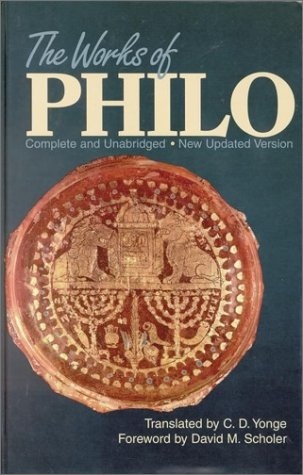










Philo Judaeus, the great Jewish exegete and philosopher, was a contemporary of Josephus and the Apostles Paul and Peter during the 1st century A.D. This volume of his complete works must be one of the most, if not the most, exhaustive commentaries on the five books of the Old Testament (the Pentateuch) in existence.
In true rabbinic fashion, Philo discourses on the letter and spirit of the Pentateuch, from all the major characters of the five books of the Old Testament to the creation of the world. His prose style is a combination of stream-of-consciousness, meditation, and textual exposition. Philo's works are not merely a collection of essays on the Pentateuch, but a window into rich allegorical and contemplative mind of a great rabbi--the Pentateuch interpreted by a rabbi within the context of first century Hellenism buttressed by nearly 2000 years of a tradition personally handed down from God. Philo addresses the reader in 2nd person; it is almost as if the reader was a student sitting and listening at the feet of the rabbi.
It is, however, easy to lose one's place in the text. Philo divides his essays topically: e.g., The Creation of the World, Abel, Cain, Noah's Drunkenness, Abraham's Exodus from Ur, The Tower of Babel, Moses, etc. Within each essay, however, Philo waxes upon the topic and upon anything tangentially related to it in a great stream-of-consciousness. Moreover, the text is invariably printed in two columns, justified, separated with a line in 10 point font on every page, front and back. If it were not for the consecutive paragraph numbering, the text would seem like a great jumbled mass of impenetrable rabbinic commentary.
But Philo writes some true gems, and it is worth culling the dense text for them. His first essay alone, "On the Creation of the World", justifies purchasing the entire volume. Philo's exposition of Genesis chapter 1 is second to none. Not even St. Augustine's commentary of Genesis in "City of God" raises you to such heights. One of Philo's many insights into the purpose behind the order of creation is his answer to why God created vegetation before He created the sun. Philo's final essays, "Questions and Answers," offers his interpretation into every conceivable question concerning the Book of Genesis. In between "On the Creation of the World" and "Questions and Answers" are fascinating commentaries on all major characters in the first five books of the Old Testament and on the laws, the Ten Commandments and the 613 laws in the Pentateuch.
Philo's works are still relatively obscure. But they rank with the works of Josephus. Josephus gives us history; Philo, interpretation. It is as if Philo was a Jewish Augustine who mixed "Confessions" and "City of God" into one volume.

